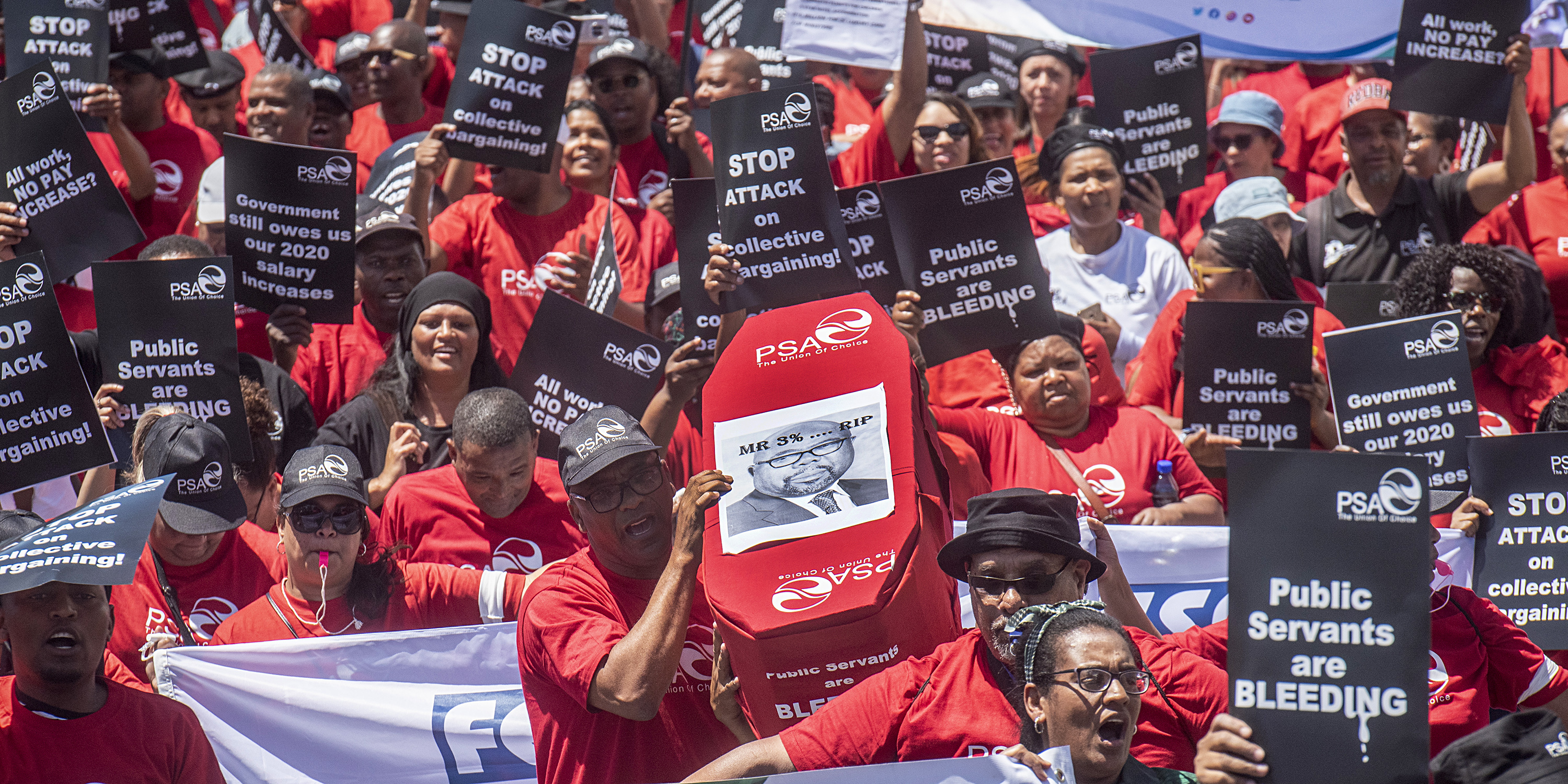Trade unions representing public servants and the government are closer to inking a pay rise deal for 2025/26. If finalised before the new fiscal year starts on 1 April, it will bring stability to public finances and improve the long-strained labour relations in the public sector.
Some trade unions are willing to accept the government’s offer of increasing the pay of more than 1.3 million public servants by 5.5% from 1 April. The pay of public servants including teachers, nurses, police and prison officers, doctors and government administrators would then be adjusted in line with the consumer inflation rate in 2026 and 2027.
Daily Maverick canvassed the views of three trade unions that represent public servants, which all want the three-year deal to be confirmed expeditiously – even before the start of the government’s fiscal year.
Reuben Maleka, general manager of the Public Servants Association of South Africa (PSA), said the feedback from the 245,000 public servants it represents has been “positive”, indicating that they are willing to accept the government’s multiyear pay rise offer. The association gave its members until 31 January to formally indicate whether they accept or reject the offer. The trade union wants to conclude a deal before the end of February.
Other public sector trade unions that have struck a similar note to the PSA and are warming up to the government’s offer include Solidarity and some that are affiliated with labour union federation Cosatu.
Other unions, including the Democratic Nursing Organisation of South Africa (Denosa), which is affiliated with Cosatu and is the country’s largest nursing union, are still surveying its members on the 5.5% pay rise offer.
Denosa president Simon Hlungwani, who is also the chief negotiator for Cosatu-affiliated unions at a bargaining council for public sector employment conditions, said nurses have until Thursday, 6 February to give their views on the pay offer.
However, a trade union source linked to the negotiations said the early feedback from public servants indicates that they will accept 5.5% because they don’t believe the government will sweeten its final offer. A 5.5% pay adjustment is arguably good considering that it is above the inflation rate, which averaged 4.4% in 2024 and is expected by the South African Reserve Bank to reach 4.6% in 2025.
Public servants’ pay will be linked to the inflation rate for 2026 and 2027, but increases will be capped at 4% and 6%.
Beyond pay, the government has improved other remuneration benefits.
It has offered increases in various allowances, including housing (from R1,784 to R1,900 from Tuesday, 1 April, with a further inflation rate adjustment for 2025/26).
The danger allowance increases from R623.29 to R650 for 2025/26 and thereafter by the inflation rate, and the special danger allowance will be adjusted from R931.82 to R950 on the same date.
A danger allowance is allocated to public servants exposed to hazardous conditions by risking their lives because of the nature of their work, such as officers in the police and prison services.
Cost of the pay deal
It is not clear how much the government would have to spend to implement the proposed three-year pay rise and remuneration benefits offer. The exact cost will be revealed on Wednesday, 19 February when Finance Minister Enoch Godongwana tables his Budget in Parliament.
National Treasury director-general Duncan Pieterse refused to comment on the matter, saying the institution was in a “closed period” because of the upcoming Budget.
Treasury tabled figures in October 2024 showing that it plans to spend R798.3-billion in 2025/26 to remunerate public servants – expenditure that is set to swell to R832.6-billion in 2026/27 and R868-billion in 2027/28.
The cost to pay public servants every fiscal year is the largest component of government spending, gobbling up 37% of its revenue. In other words, 37% of the government’s spending in 2025 will compensate just 2% of the population (about 1.3 million public servants). The remuneration cost has crowded out spending on goods and services in hospitals, schools and police stations, and gobbled budgets for pro-growth infrastructure projects.
Reforms in public finances
There are two positive developments in the latest round of pay negotiations, which should help to stabilise public finances.
First, trade unions are set to conclude a pay rise deal for 2025/26 before the start of the new fiscal year for the first time in nearly five years.
Second, trade unions and the government are returning to the regime of concluding multiyear pay agreements instead of returning to the negotiating table every year, which has been the case since February 2020.
Labour relations between trade unions and the government soured intensely from February 2020 when former finance minister Tito Mboweni reneged on the third year of an existing pay agreement, saying it was unaffordable. The agreement would have given public servants an increase of the inflation rate at the time plus 2%.
Mboweni also forged ahead with a three-year pay freeze for public servants to cut government expenditure and ballooning debt.
These two developments are set to give Treasury time and space to find ways to fund the new pay deal, either from existing public resources or raising money in debt capital markets. For trade unions, a multiyear pay deal, if concluded in good faith, guarantees that the pay of their public servant members will be automatically adjusted every year, thereby avoiding disputes and potential strikes.
Some trade unions are reporting an improvement in their relationship with the government, which is playing open cards about public finances and affordability. This has also helped trade unions to moderate their pay expectations.
Said the PSA’s Maleka: “There is a much better relationship with the employer.” DM
This story first appeared in our weekly Daily Maverick 168 newspaper, which is available countrywide for R35.






